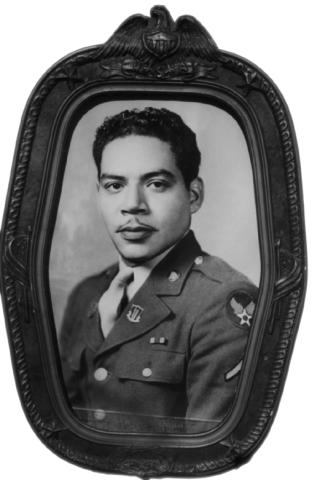
By Patrick Lynch
The story of the Botello brothers – Crisantos, Gregorio, John, Simon and Trinidad, who all served during World War II – is one of honor and bravery. And thanks to another of the brothers, their tales of heroism won’t be lost to time.
Younger sibling Thomas D. Botello wrote a booklet called “Proud I Served” about his brothers’ service in WWII, also detailing his family’s struggles back home. The narratives included present a glimpse into history from the perspective of a Mexican American family during that era.
“Proud I Served” details his family’s history leading up to the war, tracing their lives as sharecroppers on farms in rural Central Texas. He recalls times spent with family and friends working in the towns, noting how the entire clan labored together within the region.
Botello’s parents, Crisostomo E. and Jesusita D. Botello, had 10 boys and two girls. Of the brothers, the five oldest would enter the service.
News of the war reached the Botello family through newspapers, radio reports and word of mouth. Food was rationed, and the family gathered rubber and metal products for the government to purchase.
Botello writes that before the war, his brothers weren’t ideally suited to join the Armed Services, since they lacked an adequate education. To him, the most important prerequisites for being a soldier were “sound reasoning and comprehension,” both attributes secured with a good education. His brothers were denied this because of their ethnic background and social status, he says. Fortunately for Botello and countless other children, a change in attitude by virtue of the war led to a mandate for all kids to attend school.
Because they weren’t in school, the four oldest brothers helped out on the farm and made up the majority of their father’s labor force. As a result, the family felt the impact of the young men’s induction into service especially hard. Their father was forced to give up the farm and move closer to the city, where he was able to find a house on a smaller, 3-acre plot, maintaining a stock of milking cows, pigs, rabbits and fowl single-handedly.
The brothers sent frequent letters, often replete with emotional descriptions of their struggles and experiences. And the Secretary of the War Department sent telegrams reporting injuries and casualties. The Botello family received three of these, each alerting that one of the sons had been wounded in battle.
The family was greatly relieved when the war ended in 1945, but they were still uncertain when the boys would return. Any activity in front of the house raised hopes that maybe one of the brothers was approaching.
Botello also includes excerpts from interviews and diaries of each of his brothers (except for Crisantos, or “Cris,” because Botello apparently didn’t have access to a diary and Cris had died before Botello began conducting interviews). These accounts detailing the journey home are often accentuated with homespun details. For example, Trinidad Botello describes in the passage below how he was greeted in the front yard first by the family dog he’d only gotten to know briefly before going off to war:
I remembered the last time I was home we had a small dog which had been given to John by the Ramos family before they moved away. I remembered he had given him the name Sergeant because he said after he would enter the service he was going to make a sergeant.
I kept walking and finally saw a house in front of me. I thought this must be it. I was about two hundred feet away and the dog came straight to me. I called out “Sergeant” to see what he would do, and he started to raise his fore legs and plant them on me, but I didn’t cooperate with him because I was afraid he might do something to attack me. Instead, he circled around me two or three times and then headed to the house. It was them that I realized he actually recognized me after I had been gone for almost two years, and he wanted to tell me how happy he was to see me.
Thomas D. Botello’s “Proud I Served” was self-published in 2001.

